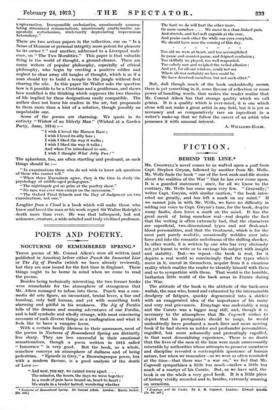FICTION.
BEHIND THE LINE.* Mn. COGSWELL'S novel comes to us wafted upon a pull from Capt. Stephen Gwynn, followed by another from Mr. Wells. Mr. Wells finds the book " one of the best rank-and-file stories about the realities of the War ".that he has ever come upon. It is a guarded statement ; since, for all we know to the contrary, Mr. Wells has come upon very few. " Generally," writes Capt. Gwynn, with similar caution, " the book inter- ested me greatly, and has left a mark on my mind." If we cannot join in with Mr. Wells, we have no difficulty in adding our voice to Capt. Gwynn's tune, for the book, despite many faults, does leave a mark on the mind. It has the great merit of being somehow real—real despite the fact that the writing is often extremely bad, that the characters are superficial, two-dimensional types and not flesh-and- blood personalities, and that the treatment, which is for the most part purely realistic, occasionally wobbles over into farce and into the romantic melodrama of the shilling shocker. In other words, it is written by one who has very obviously not yet learnt to write or to envisage his subject with insight and stability. But—we repeat--the book is real, for it depicts a real world so convincingly that the types which move in it, unreal in themselves, acquire from it a vicarious reality which enables the reader to identify himself with them and so to sympathize with them. That world is the horrible, barbarian little world of the back areas in France during the War.
The attitude of the book is the attitude of the back-area wallah, the man who, bored and exhausted by the interminable drudgery of fatigues, quickly degenerated into a shirker with an exaggerated idea of the importance of his many and very real grievances. Ermytage was undeniably a mug and the Curate was a bigger mug still, and, though it is necessary to the atmosphere that Mr. Cogswell wishes to depict that his protagonists should be mugs, he would undoubtedly have produced a much finer and more moving book if he had shown us nobler and profounder personalities, engulfed, but more ashamedly and protestingly engulfed, in that most demoralizing experience. There is no doubt that the lives of the men at the base were made unnecessarily miserable by authorities whose attempts to preserve smartness and discipline revealed a contemptible ignorance of human nature, but when we remember—as we were so often reminded at the time—that there was " a war on," we feel that Mr. Cogswell sympathizes a little too much—makes a little too much of a martyr of his Curate. But, as we have said, the book is on the whole a very good book. It is a little piece of history vividly recorded and is, besides, extremely amusing on occasions.
• RrooMage and the Curate. By A. Y. Cogswell. London: Edward Arnold. 17s. ad. net.]










































 Previous page
Previous page